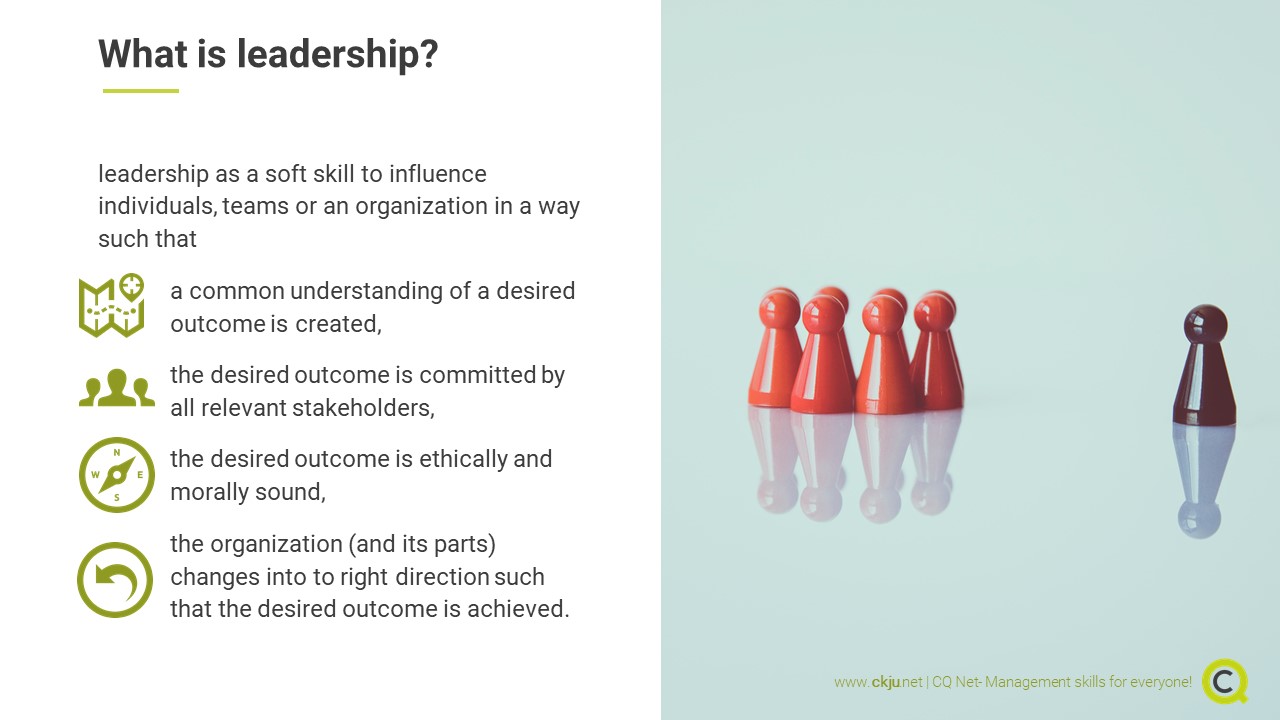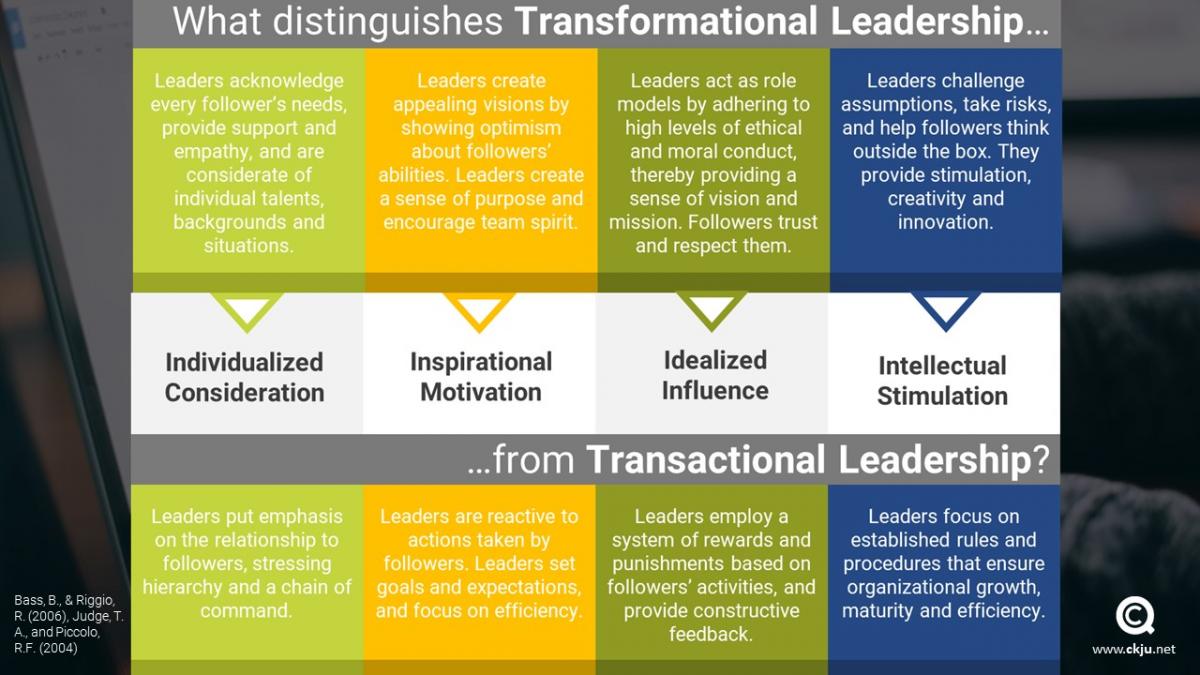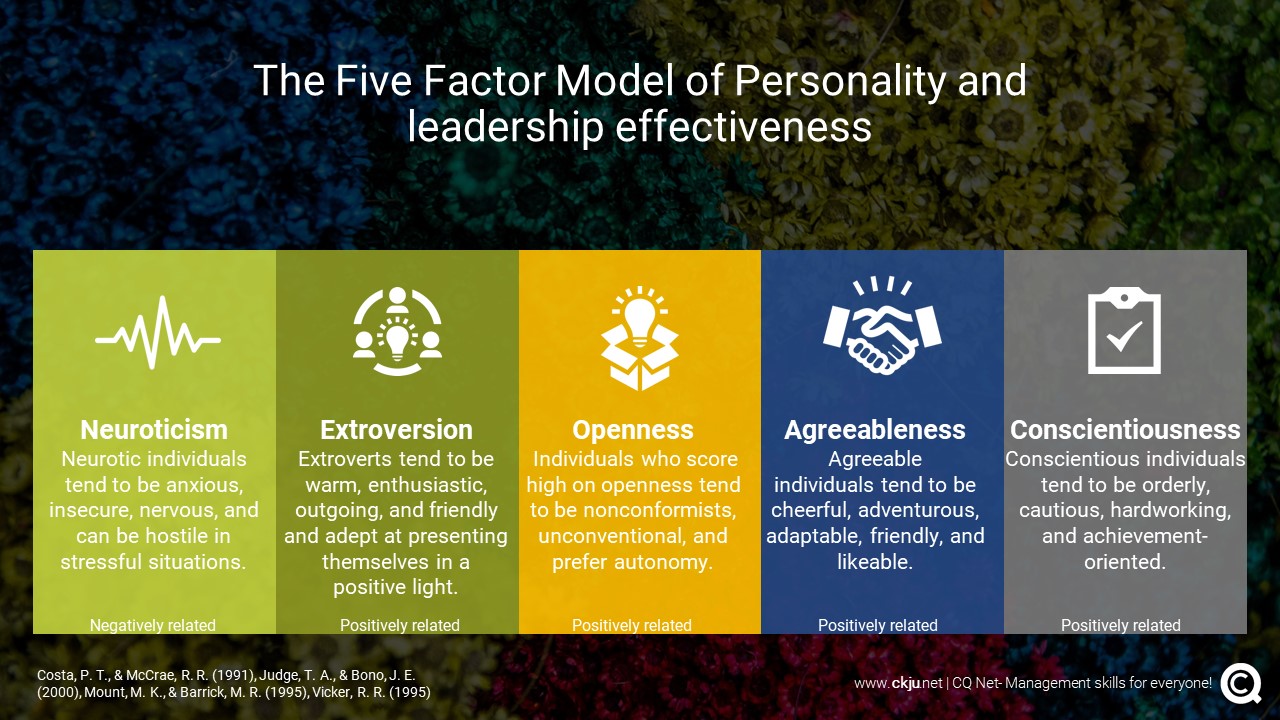Contents
- Leadership is a core management skill
- There is no single leadership theory but different leadership approaches
- This how to lead guide helps to build your leadership skills
- What is leadership? Leadership defined
- There is no one size fits all leadership approach
- Transactional leadership versus transformational leadership
- Must read CQ management resources on Transformational and Transactional Leadership
- Trait approach to leadership: Which traits and skills make a good leader?
- Personality traits, skills and training have an impact on leadership effectiveness
- Many personality models and tests to measure leadership effectiveness are flawed
- The five factor model of personality and leadership effectiveness
- Learn more about leadership effectiveness and personality in a career counseling session
- Authentic leadership
- Complexity leadership model
- Implicit leadership theory
- Leader Member Exchange theory (LMX)
- The dark side of leadership: Toxic and destructive leadership
- Shared and distributed leadership
- Leadership derailment and incompetence
- Agile leadership
Leadership is a core management skill
Leadership is one of the core management skills that will help you to boost your career and personal growth. We at CQ Net - Management skills for everyone! go even further and argue that leadership skills are the very foundation to effectively work together with other people and "have an impact". Consequently, leadership is not just relevant for CEOs, senior executives, and line managers, but for everyone in and beyond business.
There is no single leadership theory but different leadership approaches
The current state of leadership knowledge is best described as different leadership approaches supported by a more or less strong body of evidence regarding their effectiveness. This way of understanding leadership from an Evidence-based Management point of view is in stark contrast to the simplified concepts promoted by many popular business books and articles. However, in contrast to those simplified concepts, leadership approaches backed by a sound scientific foundation do make a difference in real life settings.
This how to lead guide helps to build your leadership skills
This "how to lead guide" helps you to build your leadership skills today. You'll also find CQ Dossiers and journal papers with more information about each leadership approach. However, please keep in mind that the body of evidence related to a specific business challenge is always an incomplete snapshot at any given point in time. This also applies to leadership!
Besides this "how to lead guide" we offer leadership trainings, webinars and career counseling sessions that help you to build and strengthen your management skills. When you miss a specific leadership topic please get back to us or drop us a message. We make high quality management training available and affordable for everyone!
What is leadership? Leadership defined
There are at least as many definitions of leadership available as leadership approaches. In this "how to lead" guide we will stick to leadership as a soft skill to influence individuals, teams or an organization in a way such that
- a common understanding of a desired outcome is created,
- the desired outcome is committed by all relevant stakeholders,
- the desired outcome is ethically and morally sound,
- the organization (and its parts) changes into to right direction such that the desired outcome is achieved.

Some of the key terms mentioned in above leadership definition are desired outcome, committed, ethically and morally sound and change. While we don't want to get too theoretically here, it makes sense to have a brief look at the meaning behind each of these terms.
Leadership and desired outcomes
Leadership is very much about shaping the future in the present. It can be about a task you want to get done together with some of your peers, a project you want to implement or even strategic long-term targets that act as future state for your company, Non-Governmental Organization or institution. This makes it clear that wherever people start to think where to go (desired outcome) and how to achieve it leadership takes place.Leadership and comittment
By definition, humans tend to put individual interests first. This type of behaviour is deeply rooted in human nature. However, in our 21st century knowledge economy lone wolfs won't achieve too much if they don't manage to find people supporting their endeavors. This is where leadership and commitment kicks in. Your task will be to convince people to put their individual interests behind and instead bundle forces to achieve a shared objective.Leadership and ethics
Leadership is a powerful tool and history has shown many times which devastating effects destructive, unethical leadership can have on individuals, organizations and the society. You must be aware of the bright and dark side of leadership just to make sure you always choose the bright one. In addition, most of us have made some sort of experience with destructive leadership during our (professional) career. Building your own leadership skill will be the basis to cope with destructive leadership exerted by others.Leadership and change
All leadership is change management. Change rarely follows a pre-defined trajectory but takes sudden changes you and your peers most properly didn't expect. This is also the reason why agility gets more and more important in leadership and beyond. Only when you monitor how things evolve on a continuous basis, initiative the right interventions to stay on track towards your desired outcome and re-adjust everything on the fly will you eventually succeed.
There is no one size fits all leadership approach
Before we have a look at the different leadership approaches, we would like to point out that there is no one size fits all leadership approach. Hence, every single of the presented leadership approach has its strengths and shortcomings and it is up to you to choose the one which promises to be most effective in your specfic situation.
Transactional leadership versus transformational leadership
A very basic understanding of leadership relies on a rather static and formal machine methaper of organizations. People are seen as resources in the same way as tools, money and other assets required to meet the organization's purpose. As a consequence, leadership is mostly about keeping the "machine" running in the most efficient way. The job of the leader is push the right buttons and manage exceptions.
This understanding of leadership is best reflected in the transactional leadership approach:
- Transactional leaders get their authority from their position in the hierarchy of an organization
- They are gatekeepers and manage the destribution of and access to resources such as money, machinery, assets and knowledge
- Transactional leadership mostly relies on management tools such as systems of rewards and punishments, feedback and deviation management

A competing and more contemporary leadership approach is called transformational leadership. Transformational leadership is more people-centric which is reflected in its four main components:
Individualized consideration
Acknowledge every follower's needs, provide support and empathy, and consider individual talents, backgrounds and situations.Inspirational motivation
Create appealing visions by showing optimism about your followers' abilities. Create a sense of purpose and encourage team spirit.Idealized influence
Act as role model by adhering to high levels of ethical and moral conduct, thereby provide a sense of vision and mission. Followers trust and respect you.Intellectual stimulation
Challenge assumptions in a constructive way, take risks and help followers think outside the box. Provide stimulation, creativity and innovation.
Even though transformational leadership might sound more appealing to you at first glance, there are certain situations where a transactional leadership style is more appropriate. For instance, think about an unsafe situation where deviations put people or mission critical machinery at risk of failure or injury. The only valid option would be to immediately address the deviation, stop it and make sure that all is safe again.
The transformational leadership style relies on insipiration and motivation which is especially important in times of change. Imagine you are in charge of a product development project. Following a transformational leadership style you will outline a vision of the new product, its benefits and how the strengths and competencies of each project team member will contribute to make the product a big success.
Must read CQ management resources on Transformational and Transactional Leadership
| Bass, B. M. (1990). From transactional to transformational leadership: Learning to share the vision. Organizational Dynamics. 18(3), 19 - 31. |
| Hogan, R., & Kaiser R. B. (2005). What we know about leadership. Review of General Psychology. 9(2), 169 - 180. |
Trait approach to leadership: Which traits and skills make a good leader?
A considerable amount of people think that leadership can only be performed on an excellent level by a small set of people with special leadeship traits. Peter Drucker, one of the founders of management science, referred to those people as naturals. The underlying question whether leaders are born (genetics) or made (environment) is still a hot topic among leadership scholars and practitioners.
Personality traits, skills and training have an impact on leadership effectiveness
Even though this discussion is almost as old as management (science), there is no clear and straightforward "yes" or "no" answer to it. When you ask some of the leading management scientists, you will get most properly an answer like "both factors have a significant impact on leadership effectiveness".
We from CQ Net - Management skills for everyone! take the stance that there are some more or less stable leadership traits one has or has not. The trait-based approach to leadership provides you some guidance how those traits look like, and how you can identify and shape them. However, these traits are nothing more than a good starting point to boost your leadership skills with the right skill development interventions.
Many personality models and tests to measure leadership effectiveness are flawed
Let us start with leadership and personality. One of the dominant personality models supported by science is the five factor model of personality. It has been around for many years and has a strong track record in terms of reliability and validity which are important quality criteria:
- In a nutshell, reliability refers to the consistency and reproducibility of results when measuring the same things – making sure that your tools are measuring what they say they are measuring not just once but a multiple times.
- Whether results accurately represent what they claim to represent is subject to the quality criteria assessing their validity.
The five factor model of personality and leadership effectiveness
You might wonder why you should care about it? There are many different personality models and tests around that do not meet basic quality standard. Hence, be carefull when doing personality tests of questionable quality as they don't add any value and even might point you in the wrong direction. Back to the five factor model of personality and leadership traits. The "Big five" personality traits are as follows:
- Neuroticism
- Extroversion
- Openness
- Agreeableness
- Conscientiousness

There is evidence (refer to above infographics) that neuroticism is negatively related to leadership effectiveness and the personality traits extroversion, openness to experience, agreeableness and conscientiousness are positively related to leadership effectiveness. Most of those relationships are modest to weak. Hence, use them with caution and not as basis for universal judgements regarding leadership effectiveness independent of situation and context.
Learn more about leadership effectiveness and personality in a career counseling session
In addition, the five personality traits represent a personality continuum and not a specific type. This especially applies to the NEO PI-R personality inventory which we at CQ Net - Management skills for everyone! use to conduct career counseling sessions. You want to learn more about leadership effectiveness and your personality traits? Than it is time to check out our Leadership Career Counseling!















